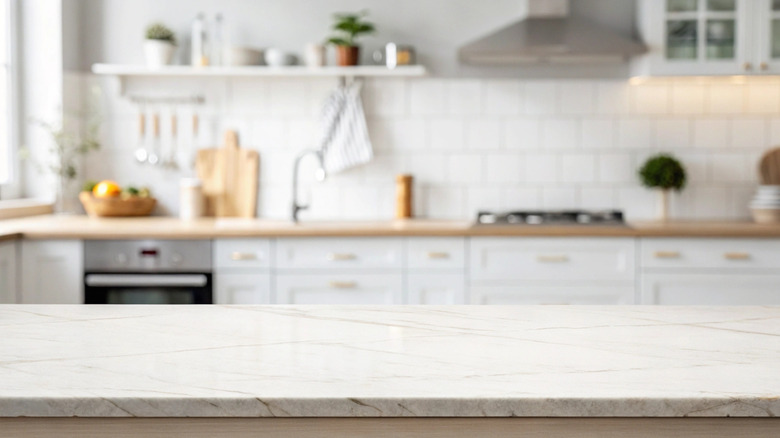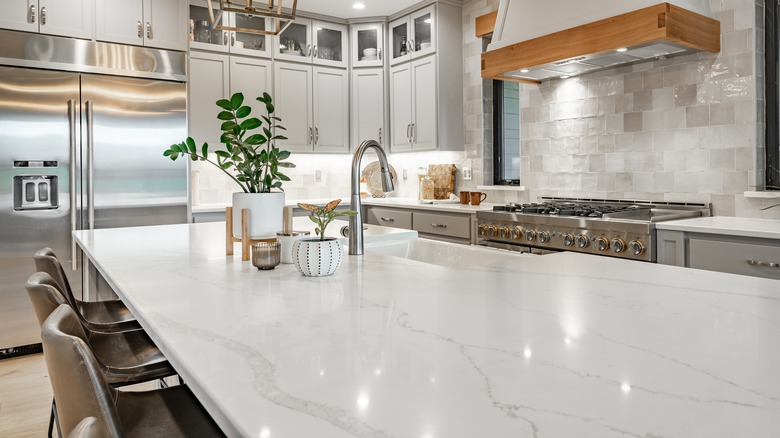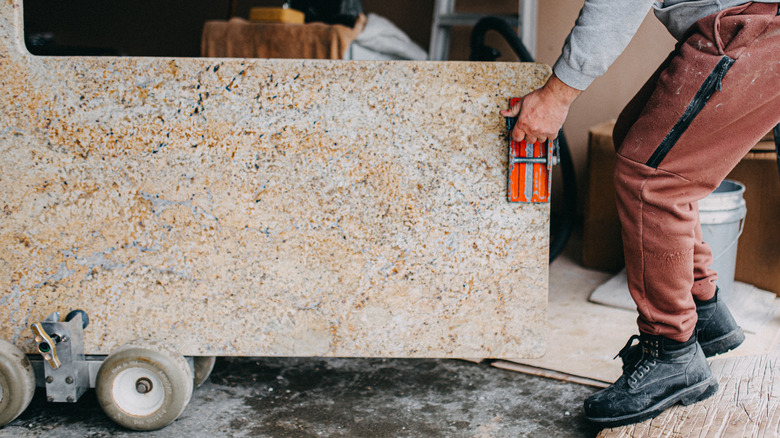Quartz Vs Granite: Which One's Better For Kitchen Countertops?
If you're redoing your kitchen, maybe you are looking into the vintage trend that's making a comeback, or putting in some old-school kitchen lighting. If a big kitchen renovation project is in your future, however, you will likely be in the market for new countertops. Two of the most popular options are quartz and granite — but which is best for you? While they may appear similar to a laymen, the two are actually very different. To learn more, we spoke to Jo Rich, designer at Raydoor Sliding Walls & Doors, to find out more about these two popular materials.
When it comes to the battle of the stones, Rich explained that quartz is a non-porous engineered stone, while granite is a natural stone. Because of this, each slab of the latter is unique, while every countertop made from the former offers consistency and easy color matching. "Quartz reads more uniform and modern, while granite provides organic depth and character," the expert said. When deciding between the two for your kitchen, it boils down to a personal preference, as you'll want to take price, maintenance, and functionality into consideration.
What is quartz?
A man-made stone, quartz is created with a mixture of quartz chips, resins, and pigments. In fact, it can be made with up to 15% of materials other than real quartz. While slabs of this stone are typically engineered to look more natural, there are some options that can look like other materials, such as slabs of solid color or even concrete. One of the many qualities that homeowners enjoy about quartz is its consistent patterns, making it easy to pick out a slab at your local warehouse or supplier that you know will look identical to the one that arrives at your home. It can get a bit pricy, ranging from $70 to $100 per square foot, and even higher for luxury options.
When it comes to durability and maintenance, quartz is resistant to stains and scratches without the need for any sealing (saving you money over time). On the other hand, it doesn't do well with high heat, so you won't want to place hot pans right on top of it.
What is granite?
While you may have heard that granite countertops aren't entirely in style anymore, there are still people who swear by this all-natural, one-of-a-kind stone. Derived from quarried igneous rock, granite is a mixture of various volcanic minerals, including quartz, mica, and feldspar. Because of this combination, expert Jo Rich noted that granite is highly durable and resistant to heat, scratches, stains, and chips. Since it's a natural stone, it's also unique in its veining and pattern, with no two slabs of granite looking exactly alike. This can be a major plus for homeowners looking for a unique piece, but it is also a gamble, since you won't know exactly what your countertop looks like until it arrives for installation.
Regarding upkeep, granite does require more maintenance than quartz. For example, it needs to be sealed annually to prevent bacterial growth and staining. It also requires regular cleaning with soap and water, as well as immediate spillage clean-ups to prevent stains. While more affordable to purchase than quartz, running at about $40 to $60 per square foot, you will be spending more over time on maintenance. "Ultimately, it depends on whether you prioritize a hands-off surface (quartz) or value the one-of-a-kind beauty of natural stone (granite)," Rich said.



